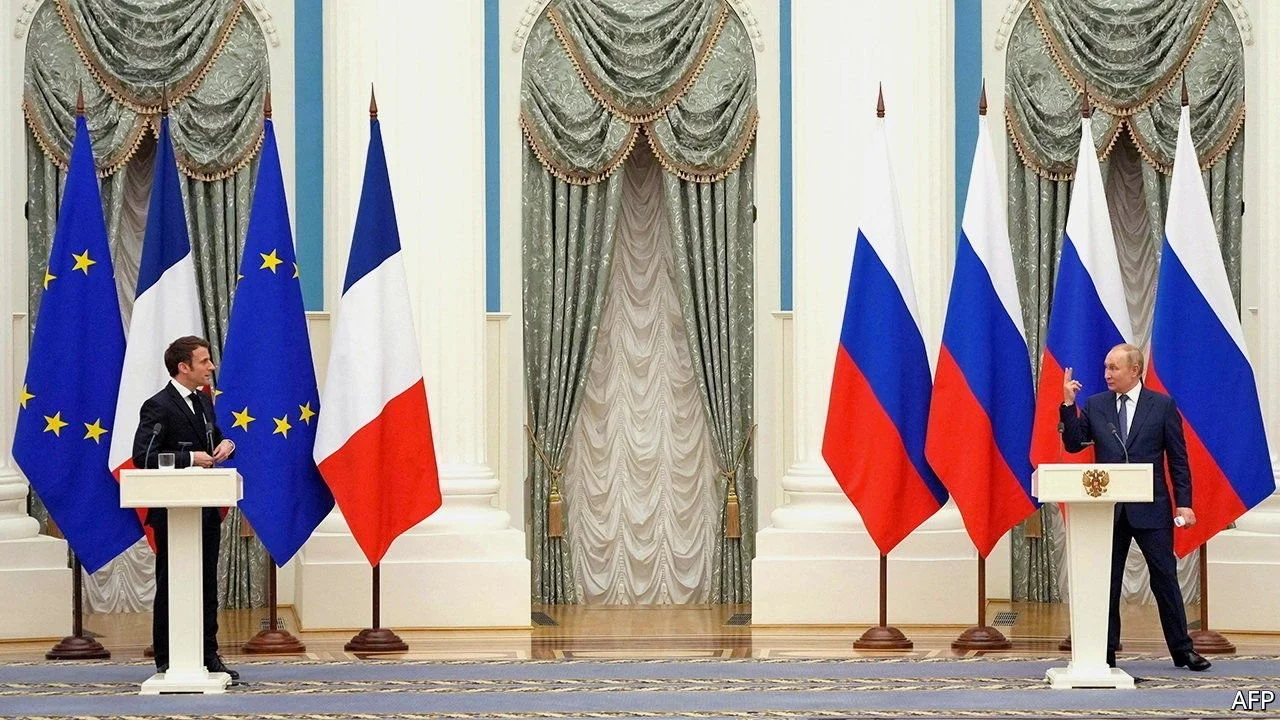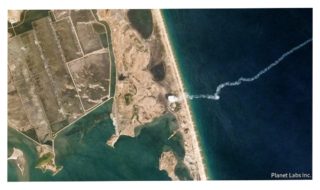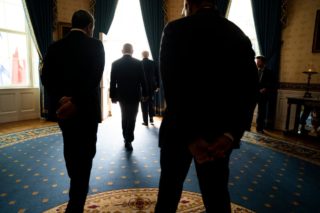
KYIV AND MOSCOW
“I DON’T BELIEVE in spontaneous miracles,” declared Emmanuel Macron shortly after boarding the presidential plane from Paris for Moscow on February 7th. The French president looked unreasonably calm ahead of one of the more testing diplomatic trips he has made since he was elected five years ago. It was a test both of his ambition to take over as Europe’s leading diplomat and of his capacity to do anything meaningful to ease tensions in the crisis over Russia and Ukraine.
After five hours of late-night talks with Vladimir Putin, Mr Macron flew to Kyiv on February 8th and stood beside Volodymyr Zelensky, the Ukrainian president, whose country lives under the threat of invasion. Mr Macron said that he had secured a pledge from the Russian president that, as things stood, Mr Putin “would not be the cause of an escalation” of the crisis on the border with Ukraine.
Promises from Mr Putin are worth what they are worth. The Kremlin was prompt to deny it had made any such commitment, and there was no publicly verifiable statement to back up his claim. As it is, Mr Macron is suspected by many Western allies of putting too much trust in the Russian leader. Yet Mr Macron, speaking on the way from Moscow to Kyiv, seemed confident that this could “unblock” things, and that it would now be “possible to make progress on negotiations” to ease tensions between Russia and Ukraine.
Mr Macron is only two months away from an expected re-election bid. His week of frenzied diplomacy is in some ways the coming together, for better and for worse, of different strands that have run through his presidency, and which will be scrutinised both at home and abroad. These include his ambition to secure Europeans a place at the high table when it comes to a crisis on their doorstep—a form of strategic voice, which Mr Macron has advocated ever since taking office.
Only three weeks ago, there was palpable frustration in Paris about being side-lined diplomatically in the face of the greatest military build-up the continent has seen since the end of the cold war. America and NATO have led and framed the dialogue with Mr Putin over the Russian build-up at its border with Ukraine, merely “debriefing” Europeans afterwards, as one French presidential adviser then put it. The “Normandy Format” of four-way talks between France, Germany, Ukraine and Russia, had stalled. Europe, viewed from Paris, seemed to have little say.
For Mr Macron, who has long argued for a strategic dialogue with Russia, to the exasperation of NATO members close to the Russian border, this was irksome. All the more so, since the French analysis of the military situation on the Russia-Ukraine border was somewhat at odds with that of Britain and America, which declared that a Russian invasion was “imminent”. French intelligence showed the same amassing of trucks, tanks and troops on the border, and French diplomats shared the view that the situation was both worrying and volatile. But French diplomats insisted that it was not possible to deduce that an offensive was imminent.
It is against this background that Mr Macron’s diplomatic tour this week has to be set. He has in the past faced criticism for his freewheeling unilateral approach. Ahead of his trip to Moscow this week, some argued that it was unhelpful to hold a separate parallel dialogue with Mr Putin outside NATO. They suspect the French president—despite his repeated protestations—of seeking to undermine the alliance.
Yet Mr Macron has learned from such criticism. This time, the French president secured backing for his shuttle diplomacy from President Joe Biden, as well as Jens Stoltenberg, NATO’s secretary-general, and leaders of the Baltic states. His trip was closely co-ordinated with Germany, whose chancellor, Olaf Scholz, greeted Mr Macron in Berlin straight off the plane from Kyiv. He also spoke at length to Mr Zelensky, whom he had first met in Paris when the Ukrainian leader was campaigning for office.
Mr Macron’s initiative is threefold. First, he is seeking to ease immediate tensions in order to reduce the likelihood of war. The French president afterwards described the tension in his talks with Mr Putin at the Kremlin as “palpable”, and warned that the risk of “incandescence” on European soil was still real. The French see in the Kremlin’s confirmation on February 8th that Russia would withdraw his troops after exercises in Belarus, for example, a sign that there might now be a narrow path to de-escalation.
This could be an important step towards reviving, with the Germans, the Normandy Format talks. Negotiators met recently in Paris, and are due to meet again in Berlin on February 10th. Speaking in Kyiv, Mr Macron said he hoped that the four leaders themselves might be able to meet in the coming weeks. The French argue that this is now the best way to find an “off-ramp” for Mr Putin. In the longer run, Mr Macron wants to start a broader conversation about Europe’s “new security order”, particularly on its eastern flank. Many NATO allies are deeply wary of this idea, which would somehow have to allay Russia’s fears of NATO expansion, and the contours of which remain ambiguous.
Nobody can accuse Mr Macron of lacking ambition. Mr Putin said wryly that the French president had “tortured” him by talking on and on for over five hours—at a vast oval table, and over a dinner of reindeer with sweet potatoes and blackberries. Mr Macron acknowledged that the Normandy Format, based on the implementation of the Minsk accords signed in 2015, including by Ukraine, is “politically complicated”. In Kyiv, a cautious Mr Zelensky said that he “supported” France’s position, and welcomed its help. But some elements of the Minsk accords would put him in a delicate domestic situation.
Indeed, the French president is treading a perilous path between his own friends’ suspicions and Mr Putin’s belligerence. Mr Putin may blithely trample over any commitments the French think he made. Mr Macron faces criticism in some quarters for even attempting to bring Mr Putin to heel, and in others for attempting to slip into the shoes of Angela Merkel, the former German chancellor, who was Mr Putin’s preferred European interlocutor. Mr Macron seems convinced that creative diplomatic thinking, backed by deterrence and sanctions, could yet help Europeans find a way to stop war on their own continent. In the meantime, Mr Macron may have bought some time, if little else.
By The Economist




